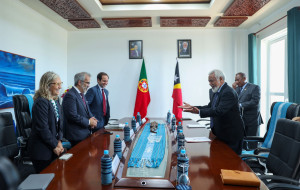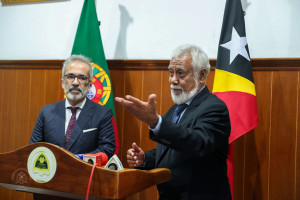On September 12, 2024, the Prime Minister, Kay Rala Xanana Gusmão, met at the Government Palace in Dili with the Portuguese Foreign Minister, Paulo Rangel, as part of the latter’s official visit to the country. The meeting focused on strengthening cooperation between the two countries, with emphasis on discussing the next Strategic Cooperation Program (SGP) for the period of 2024-2028. 
Prime Minister Xanana Gusmão expressed his satisfaction at the continued deepening of relations between Timor-Leste and Portugal, stressing that during the meeting they discussed “cooperation with Timor in various areas” and that both “reached agreement on two very important areas: the justice and education sectors”.
During the meeting, Paulo Rangel reaffirmed Portugal’s commitment to continue supporting Timor-Leste in these two sectors, highlighting that “there are two very strong areas of cooperation that were very successful in the last program, which has now ended in 2023, which are justice and education.” The Foreign Minister assured that Portugal will “put emphasis” on “strengthening cooperation in the area of education, in the teaching of the Portuguese language, but also in the general education of the Timorese and, therefore, we will strengthen this dimension and also the dimension of justice”. 
In the justice sector, cooperation will focus on training magistrates, strengthening the courts and preparing advisors for the public administration. The minister stressed that “Timor-Leste is a state whose democratic values of the rule of law, the values of respect for freedoms, are very high in the sense that, in this area of Southeast Asia, it is certainly one of the most democratic states, in which freedom of the press is most respected and this is a very great asset”.
In addition to bilateral cooperation, Paulo Rangel highlighted Timor-Leste’s geo-economic importance in the Indo-Pacific, stating that the country, “which used to be a peripheral country, is in the middle of this new centrality, because Timor is a country that makes the transition between the Indian Ocean and the Pacific Ocean.” From this perspective, Timor-Leste “is a hyper-central country, it’s not a peripheral country and this is something I’d like to draw attention to, this geopolitical and, in particular, geo-economic circumstance, because it’s a factor in the attractiveness of this country, which obviously has to be taken into account in future investment and foreign investment decisions.”
The meeting was also attended by the Minister for Foreign Affairs and Cooperation, Bendito dos Santos Freitas and the Portuguese Ambassador to Timor-Leste, Maria Manuela Freitas Bairos.
Paulo Rangel’s visit to Timor-Leste, which runs from September 12th to 14th, also includes meetings with the President of the Republic, José Ramos-Horta, and Cardinal Dom Virgílio do Carmo, Archbishop of Dili. The program of the visit also includes visits to various cooperation projects, such as the Portuguese School in Dili, the CAFE School in Dili, the missionary work of the Slave Sisters of the Most Holy Eucharist and the Mother of God, and the FOCO project – Train, Orient, Certify and Optimize, in partnership with the National University of Timor Lorosa’e.
Portugal’s Foreign Minister will also take part in a series of conferences as part of the celebrations for the 25th anniversary of the International Force for East Timor (INTERFET).